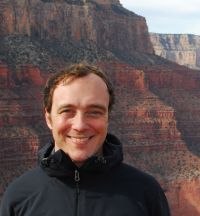|
|
|
Many of our UW
Astrobiology alumni fly high and far, and here we showcase the impressive and
exciting career of UWAB alumnus Dr. Ken Williford. UWAB grad student Owen Lehmer interviewed Ken
to learn more about Ken’s career path and his current position at the NASA
Jet Propulsion Laboratory as the Mars 2020 Deputy Project Scientist.
It was 2007 from the
Earth and Space Sciences department. How did you get to
where are you now and what are you currently working on? Currently I’m at JPL
where I run the Astrobiogeochemistry Lab, abcLab for
short, and I serve as the Deputy Project Scientist for the Mars 2020 rover
mission. I originally came to JPL to set up an organic geochemistry lab, with
the ambitious goal of one day analyzing
samples returned from Mars. Not long after arriving at JPL I took a job on
MSL (Mars Science Laboratory) as the Surface Sampling System Scientist. My
job was to mediate communications between the science team and the
engineering team on issues of targeting. I very quickly got a taste of what
it can be like at JPL to play a small part in a very big operation. The
science team had identified a target region near the first drill target, John
Klein, that they wanted to sample. I chose a spot within this region that I
felt gave us the best chance of getting the science we wanted, drew a circle
with the diameter of the drill bit on a rover image and passed it on to the
team. A few days later there was a hole on Mars in that spot, and that sample
– called Cumberland – is still yielding major scientific discoveries. Later I
joined the SHERLOC (Scanning Habitable Environments with Raman and
Luminescence of Organics and Chemicals) proposal, which was selected for Mars
2020. Not long after that I was asked to be the Deputy Project Scientist for
the mission. How is your
current research related to astrobiology? In my lab we study the
formation, preservation, and detection of signs of ancient life and
environment in geologic samples. We work on Earth rocks, but it’s all done in
the interest of finding life beyond Earth. We develop methods and
interpretive contexts that we hope will help us understand samples taken on
Mars. Of course, the goal of Mars 2020 is to seek evidence of ancient life on
Mars, and in my opinion, this is the most serious NASA has been in searching
for life beyond Earth since Viking, which launched the year I was born. What did you study
while at UW? Does it still play a role in your current work? I studied the behavior
of the carbon and sulfur cycles during a mass extinction at the end of the
Triassic period, in part to compare it with another mass extinction 50
million years earlier at the end of the Permian. As far as we know, both of
these mass extinctions were intrinsic – meaning they were caused by processes
within the Earth system – rather than extrinsic processes, such as a
meteorite impact. One of the reasons I study mass extinctions is to
understand how planetary habitability evolves over time and can collapse, as
it seems to have done on Mars. In your opinion,
what's one of the most amazing things about your current work in astrobiology
or about astrobiology in general? The most amazing thing
about my current job on Mars 2020 is the opportunity to directly search for
evidence of life on another planet. I feel so fortunate to be able to do that
and feel very well prepared from my time at the University of Washington. Is there anything
else you want to add or any advice you'd like to offer for current/future
students in astrobiology? I want to emphasize how
fortunate I feel to have been a part of the University of Washington (UW)
Astrobiology Program and the NASA Astrobiology Institute. The curriculum in
the UW Astrobiology Program is unique as far as I know and the opportunities
for interdisciplinary studies, research rotations, and field trips allowed me
to operate comfortably across many different disciplines. As for advice… At
some point there was a natural shift in my focus away from earlier concerns
toward a simple pursuit of excellence in my work and collaborative
relationships. It was important to have faith at times of transition that the
right opportunity would present itself. If you have five minutes to spare, I
recommend “The Old Astronomer” by Sarah Williams. If you have a bit longer,
the Bhagavad Gita. -Interview conducted by Owen Lehmer (ESS) |
|
THIS E-NEWSLETTER WAS SENT BY:
|


